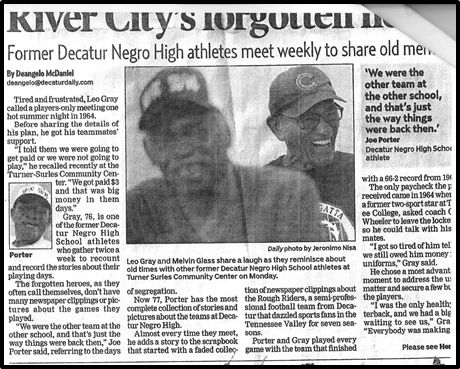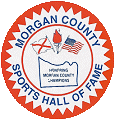2015 INDUCTEE - LEO GRAY
By David Elwell
For the Decatur Daily
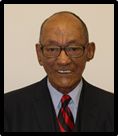 Leo Gray recalls the bus rides into the big cities like it happened yesterday. "We came in on a Greyhound bus called 'Big Red' blowing an air horn," Gray said. "On the side of the bus in big letters were the words 'Indianapolis Clowns.' We would ride all over town and people would follow us wanting autographs."
Leo Gray recalls the bus rides into the big cities like it happened yesterday. "We came in on a Greyhound bus called 'Big Red' blowing an air horn," Gray said. "On the side of the bus in big letters were the words 'Indianapolis Clowns.' We would ride all over town and people would follow us wanting autographs."
The Indianapolis Clowns were to baseball what the Harlem Globetrotters are to basketball. The Clowns, who were all black, were great athletes mixing baseball with show business. Gray was a part of the show for four years into the early 1960s. He played shortstop or third base and usually batted second. Even though the team called Indianapolis home, the Clowns spent most of the year traveling around the country and into Mexico and Canada. "We called it barnstorming," Gray said. "The Clowns played in the Negro American League for several years, but the ownership saw there was more money to make in barnstorming."
The Clowns left the NAL after the 1954 season. The barnstorming continued until the team disbanded in 1989. "The people that ran the team had experience working with Ringling Brothers Circus," Gray said. "They knew how to promote. When we got to a town there would be posters on all the street corners, like circus posters. They knew high-quality entertainment was coming to town."
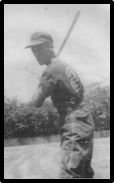 Gray, who starred in baseball, basketball and football at Decatur Negro High, signed with the Clowns for $1,500 a month after playing some minor league baseball in Illinois. Two other Decatur natives, Floyd Humphrey and Junior Vaughn, had careers with the Clowns. "I enjoyed it. It was a first class operation," Gray said. "We got paid the first and 15th of each month. The room and board and meals were like we were playing in the majors. They took care of us."
Gray, who starred in baseball, basketball and football at Decatur Negro High, signed with the Clowns for $1,500 a month after playing some minor league baseball in Illinois. Two other Decatur natives, Floyd Humphrey and Junior Vaughn, had careers with the Clowns. "I enjoyed it. It was a first class operation," Gray said. "We got paid the first and 15th of each month. The room and board and meals were like we were playing in the majors. They took care of us."
The Clowns played in the best ballparks in the country. Gray remembers visiting Yankee Stadium, Ebbets Field and the Polo Grounds in New York. He played at Fenway Park in Boston. Wrigley Field and Comiskey Park in Chicago were also stops for the Clowns. "Two of my favorite places to play were Doubleday Field in Cooperstown, New York, and Rickwood Field in Birmingham," Gray said. "Those are two of the oldest ballparks in the country."
The Clowns even played in Decatur at the old Legion Field that used to be on Sixth Avenue. Every player added to the mystique of the Clowns by having a comedy routine. Every player had a nickname. Gray's nickname was "Squeeky" because of his high-pitched voice. "Everybody knew who was going to win the game," Gray said, "but the people still came. They came out to see a show and we put one on for them."
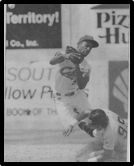 One of the team's traditional acts was the Shadow Ball routine. The players warmed up for the game by going through all the throwing, batting and fielding motions without using a ball. "One of my routines was to throw a ball and have it come back to me," Gray said. "I used an elastic string."
One of the team's traditional acts was the Shadow Ball routine. The players warmed up for the game by going through all the throwing, batting and fielding motions without using a ball. "One of my routines was to throw a ball and have it come back to me," Gray said. "I used an elastic string."
Gray had a teammate who could juggle as many as eight baseballs at one time. Another player could juggle six baseball bats. One routine had the catcher block the umpire's view and then start calling balls and strikes. Gray had a routine where he would change into a prison uniform during the game. "When someone got on first base, I would run out there and knock him off the base and take his place," Gray said. "I would get caught in a rundown between first and second. Before they had time to tag me, I would pull a small base out of my shirt, throw it on the ground, fall on it and call myself safe."
Pitcher Satchel Paige was a big-name draw for the Clowns. He would throw at least one inning in every game. Some of the best baseball for the Clowns came after the major league season ended. Major league players would play exhibition games looking for extra money. "We played a game in New Jersey one year against a team that had Monte Irvin, Joe Black, Don Newcombe and Larry Doby," Gray said. "They were all famous major league players, who had retired, but could still play some ball." Even though the crowds for their games were mostly white, Gray said the players had to deal with racism outside the ballpark.
"That was just the way it was in those days," Gray said. "We knew where we could go and where we couldn't." Gray left the Clowns after four seasons because of his growing family in Decatur. Plus, he was tired of the travel. "Some days we would play an afternoon doubleheader, travel to another town and play a night game," Gray said.
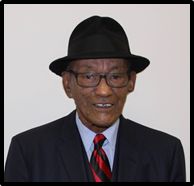 "Then we would travel to another town. Sometimes it would be three or four in the morning before we got to bed." Just because Gray's days with the Clowns were over did not mean his athletic career had ended. He was one of the original members of the Decatur Rough Riders, a semi-pro football team that broke racial barriers with black and white players. Gray also played semi-pro baseball with the Decatur Nationals. "The man can tell some amazing stories," Joe Porter, Gray's older brother, said. "He had a tremendous career. Our family is really proud of what he's done."
"Then we would travel to another town. Sometimes it would be three or four in the morning before we got to bed." Just because Gray's days with the Clowns were over did not mean his athletic career had ended. He was one of the original members of the Decatur Rough Riders, a semi-pro football team that broke racial barriers with black and white players. Gray also played semi-pro baseball with the Decatur Nationals. "The man can tell some amazing stories," Joe Porter, Gray's older brother, said. "He had a tremendous career. Our family is really proud of what he's done."
 
